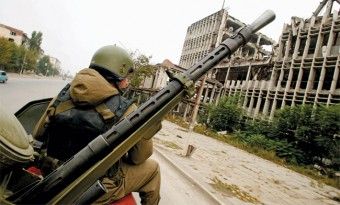
Publisher:
Bonnie King
CONTACT:
Newsroom@Salem-news.com
Advertising:
Adsales@Salem-news.com

~Truth~
~Justice~
~Peace~
TJP
Jan-13-2013 22:27

 TweetFollow @OregonNews
TweetFollow @OregonNews
Russia Upgrading, Strengthening Military
F. Michael Maloof Special to Salem-News.comMoves Aimed at Sending Message to U.S.
 Courtesy: WND |
(WASHINGTON DC WND) - Moscow is strengthening its military as a way to underscore its influence over the region it intends to encompass in its customs-free Eurasian Union, and analysts say the move is aimed primarily at countries such as the United States which have their own interests in the region, according to a report from Joseph Farah's G2 Bulletin.
These upgrades include reform of Russia's conventional military and a modernization of its strategic nuclear capabilities to enable it to overwhelm a proposed U.S. missile defense system located in Europe as a signal to the U.S. not to interfere in what Russia regards as its sphere of influence.
Russian President Vladimir Putin has shown a firm determination to enact his concept of the Eurasian Union, on which he campaigned heavily in his runup for election recently. He apparently isn't tolerating any criticism, especially from the United States, as seen in the recent Russian reaction to comments from U.S. Secretary Hillary Clinton.
She basically accused the Russians of using the Eurasian Union as a cover to "re-Sovietize" those countries which once were part of the Soviet Union.
Some analysts have questioned how Washington can hope for better relations with Moscow given its opposition to Putin's Eurasian Union initiative.
Moscow is especially concerned with Clinton's remarks, since the U.S. opposition to the Eurasian Union suggests that the U.S. may attempt to offer security and economic alternatives as an incentive to those countries not to join.
As a show of determination, analysts say, Russia intends to increase its national defense and national security spending by more than 30 percent of its annual budget.
The intent is to show a "resolute" determination that it will not allow Western interference in the region which encompasses its Eurasian Union concept.
Putin also has other overarching strategic considerations.
A number of leaders from the Central Asian countries - namely Nursultan Nazarbayev who is the president of Kazakhstan - believe it is important to fill any vacuum of outside influences including those from the U.S. and even countries of the European Union.
In addition, Moscow for years has smarted over the presence of troops from the U.S. and the North Atlantic Treaty Organization in Afghanistan, next door to Russia. Yet, it has tolerated that presence since the troops have been engaged for a decade in fighting terrorists which also threaten the Russian homeland.
At the same time, the Kremlin knows those troops are due to leave at the end of 2014, and will not tolerate any significant force remaining behind afterwards to train Afghan security forces, as is now under consideration.
In addition, Russia is leery of Chinese intentions. Beijing in recent years has shown an increasing interest in the Central Asian countries, given its proximity to them, principally for the resources they offer.
Putin is determined to have his Eurasian Union become "one of the global poles of power," connecting Europe and the Asia-Pacific region - something which even Beijing may consider a potential encroachment in its traditional sphere of influence in East Asia.
This concern recently has been heightened by Moscow's economic and military sale overtures especially to Vietnam.
Analysts suggest that instead of Clinton's hard line toward the establishment of a European Union, there may be a happy middle-ground alternative.
They suggest that Washington may want to be flexible enough to accept closer Russian ties with its post-Soviet states in exchange for those countries adopting institutions modeled after the European Union. That would ensure their sovereignty and openness to other outside influences, such as those from the U.S.
http://www.wnd.com/2013/01/
ABOUT YOUR GUEST: F. Michael Maloof, a former senior security policy analyst in the Office of the Secretary of Defense, has almost 30 years of federal service in the U.S. Defense Department and as a specialized trainer for border guards and Special Forces in select countries of the Caucasus and Central Asia. While with the Department of Defense, Maloof was director of technology security operations as head of a 10-person team involved in halting the diversion of militarily critical technologies to countries of national security and proliferation concern and those involved in sponsoring terrorism. His office was the liaison to the intelligence and enforcement community within the Office of the Secretary of Defense in halting transfers and using cases that developed from them as early warnings to decision-makers of potential policy issues.
 |
 |
 |
Articles for January 12, 2013 | Articles for January 13, 2013 | Articles for January 14, 2013
Quick Links
DINING
Willamette UniversityGoudy Commons Cafe
Dine on the Queen
Willamette Queen Sternwheeler
MUST SEE SALEM
Oregon Capitol ToursCapitol History Gateway
Willamette River Ride
Willamette Queen Sternwheeler
Historic Home Tours:
Deepwood Museum
The Bush House
Gaiety Hollow Garden
AUCTIONS - APPRAISALS
Auction Masters & AppraisalsCONSTRUCTION SERVICES
Roofing and ContractingSheridan, Ore.
ONLINE SHOPPING
Special Occasion DressesAdvertise with Salem-News
Contact:AdSales@Salem-News.com




Terms of Service | Privacy Policy
All comments and messages are approved by people and self promotional links or unacceptable comments are denied.
[Return to Top]
©2026 Salem-News.com. All opinions expressed in this article are those of the author and do not necessarily reflect those of Salem-News.com.